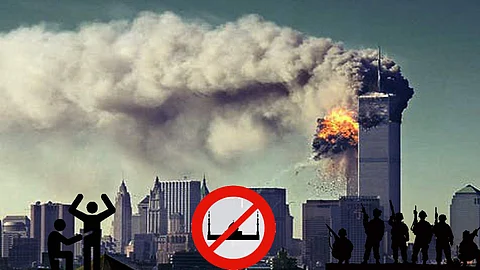

Eighteen years ago, today, terror scarred the United States of America and the rest of the world with the scariest attack of the millennium. The two planes crashing right into the World Trade Centre in New York, the third one hitting Pentagon and the last one, with the biggest target, Capitol Hill crash in an open field in Pennsylvania — thanks to the sacrifice and bravery of the passengers.
These terror attacks changed the world as we see it. The panic and mayhem spread across the world like a wildfire. After a long 18 years, we evaluate how the world has changed after the attacks orchestrated by the Al-Qaeda leader Osama bin Laden:
'Osama bin Laden has been killed'
As the mastermind behind the 9/11 attacks, Osama bin Laden became a wanted man by the United States. Intelligence agencies sought information from all over the world in an attempt to find and kill the leader of Al-Qaeda. After nearly 10 years, bin Laden was located at a compound in Abbottabad, Pakistan.
Tighter airport security all around
The biggest and most visible change after 9/11 was to the security at airports. Terrorists used lax security at airports and on aeroplanes for the attacks. As a result, airport and aeroplane security went through significant changes. Anyone flying is now used to the security measures – taking off your shoes during security checks, full-body scans, removing your laptops from their bags and only being able to carry on a certain amount of liquids. But there were a number of other changes implemented, such as new facial recognition technology, more cockpit security measures and additional air marshals that the US incorporated.
The anti-Muslim sentiment hit new peaks
The attacks of 9/11 by Islamic extremists has resulted in a distrust of Muslims in the United States and around the world. Directly after the attacks, there were a number of assaults on Muslim men and women. However, additional terrorist attacks around the world and political rhetoric have contributed to a continued anti-Islamic attitude. In 2014, the FBI reported that the number of hate crimes decreased nationally while the number of anti-Muslim crimes rose 14 per cent over the previous year.
Death of privacy as we knew it
Surveillance, across the globe, got a new meaning after the attacks. Law enforcement officials can now access records that once required a court order to obtain with a flick of a finger. Facial recognition is common at airports. And data on millions of us are being collected and stored. The Department of Justice, National Security Agency, Central Intelligence Agency and Federal Bureau of Investigations have all expanded the kinds of information being collected in search of terrorist plots.
The Wars began...and continued
The US Congress, after the attacks, voted to go to war with Afghanistan in 2001 and Iraq in 2003. Hundreds of thousands of American men and women blindly followed. Approximately 2,384 servicemen and women died during Operation Enduring Freedom in Afghanistan and 4,424 died during Operation Iraqi Freedom. At least 9,70,000 veterans have some degree of officially recognised disability as a result of the war. The newest threat on the block — ISIS — are an undesired by-product of these invasions and war.
The PATRIOT Act made it's debut
The USA PATRIOT Act was created to "deter and punish terrorist acts in the United States and around the world, to enhance law enforcement investigatory tools, and for other purposes". The act gave the USA unlimited power to indefinitely access and detain immigrants while allowing law enforcement to search a home or business without the owner's consent and giving the FBI the freedom to search telephone, e-mail, and financial records without a court order. Privacy and freedom became a myth.
Rise of Bush's Homeland Security
President George W Bush created the Department of Homeland Security in response to the 9/11 attacks. The missions of the cabinet department involved antiterrorism, border security, immigration and customs, cybersecurity and disaster prevention and management. The department has been criticised for ineffectiveness, lack of transparency and invasion of privacy.
Law enforcement = Military
As fear crept in the United States law enforcement began purchasing military-style weapons, vehicles and equipment. The militarization of law enforcement has become a concern for people that feel police have gone from serving and protecting communities to occupying them.
The Freedom Tower came up in NYC
The terrorist attacks brought down the Twin Towers, but in their footprint rose the Freedom Tower. The 104-story building was designed by renowned architect Daniel Libeskind. The building opened in November 2014. Also built on the site is the National September 11 Memorial – a tribute of remembrance and honour to the nearly 3,000 men, women and children killed during the attacks. Two reflecting pools sit within the footprints where the Twin Towers stood. The pools – which are nearly an acre each in size – feature the two largest man-made waterfalls in North America. The names of every person who died in the 2001 and 1993 World Trade Center attacks are inscribed into bronze panels edging the memorial pools.
Deportation Level: Max
The Department of Homeland Security was given the task of overseeing a range of agencies, including the U.S. Immigration and Customs Enforcement, US Citizenship and Immigration Services and US Customs and Border Protection. New rules were put in place that allowed law enforcement to check the immigration status of those arrested or stopped. There were approximately 1,89,000 deportations in 2001 compared to more than 438,000 in 2013, according to the Pew Research Center.
